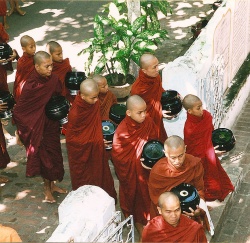Buddhism for you lesson 10-dana
1. Lesson 10 The Unlosable Treasure-Store Dana (Generosity)
2. What is Dana? Dana is the giving of useful things to other people: food to the hungry, medicine to the sick, money to the needy, kindness and compassion to all living being, and above all, the knowledge of the Dhamma to those searching for Truth. The Buddha taught us to perform 3 highly meritorious acts in order to gain happiness now and in the future. They are Dana (generosity), Sila (morality), and Bhavana (mental culture). It may sound paradoxical but one indeed possesess something worthwhile not by hoarding but by sharing with others. The more he gives to others, the more he has for his own.
3. Why the reluctance to give? People have strong attachments to possessions that they are unprepared to share. They are slaves to their possessions and greed is their master. Reluctance can also be due to fear. People are reluctant to donate blood for fear of damaging their health. A person is afraid to donate his eyes because of fears that he might be blind in his next life. Such fears are unfounded and are due to ignorance and lack of understanding and lack of compassion. Anger and hatred can also hinder a person from being generous. Under these unwholesome influences, he speaks harshly and acts mindlessly without ever thinking that others have feelings too.
4. Why should we give? We purify ourselves by giving and also increase our happiness. The act of charity promotes wholesome thoughts, actions and speech which create good Kamma. Dana is the antidote to the poison of greed. Each time we give selflessly, we chip away our mighty crag of selfishness. The Buddha taught that a person giving alms to monks or virtuous people gains 5 blessings: the affection of the many, noble associations, good reputation, self confidence and heavenly rebirth (Anguttara Nikya V, Sutta 34).
5. What is True Generosity? It is not patronage – the giving with the intention of indebting another. The one who gives is not in any way more superior to the receiver. Generosity springs from the heart. It arises with compassion, friendliness and kindness. It goes hand in hand with sympathy. True generosity is giving without ulterior motive - he gives with no strings attached; does not expect gratitude in return. He has given and that is the end of the matter. He never complains when people take his gifts for granted. The person who cultivates this virtue is on his road of growing stronger and freer with every gift he gives. He purifies himself in giving selflessly.
6. Different Aspect of Dana Dana need not be confined to material gifts. We can be generous with our knowledge, skill, time, energy. It is equally wholesome to appreciate the good deeds of others as it is a form of dana and it contributes to a harmonious society. The Lord Buddha sacrifice Himself on many occaions in His previous lives to save other beings. Giving others an opportunity to appreciate our wholesome deeds is another form of dana. When we perform deeds with pure intentions, we should let our deeds be known to others as source of inspirations to them and for them to share our merits.
7. What is the Highest Form of Dana? The gift of the Dhamma is the greatest gift of all. If you help your friend to have right understanding about good and bad deeds and how to cultivate the good, he will have happiness in this life and later lives. Once the thirst for Truth is quenched he will never thirst again. You have truly given him a priceless gift. How can you contribute? Give your time and effort to help spread the message of the Lord Buddha. Donate money to print dhamma materials – it does not matter how much you donate. Give your time to charitable and welfare organisations.
8. The Ten Transcendental Virtues (Paramis) After receiving the Definite Prophecy from Dipankara Buddha, the Boddhisatta spent 100,000 world cycles and 4 infinite periods pefecting the Ten Paramis. The Jataka Stories relate the supreme efforts of Gotama Buddha at perfecting the ten paramis in his previous births as a Boddhisatta in His efforts to attain Supreme Buddhahood. On the way to perfection, He abuses not when abused; He beats not when beaten; He annoys not when annoyed. He strives to be free from desire in the world of desires, and seeks perfection in an imperfect world. Equanimity Loving-kindness Determination Truthfulness Patience Energy Wisdom Renunciation Morality Generosity
9. The Ten Paramis - Generosity The Boddhisatta practises generosity to eliminate craving that lies dormant within Himself. However He combines wisdom with generosity so that a person does not misuse His gift. He is ever willing to render every possible aid to anyone and yet He does not want another to feel indebted and does not want reward in return.
10. The Ten Paramis - Morality Morality consists of duties one should perform and refrain from performing. One has to perform duties towards parents, children, husband, wife, teachers, pupils, friends, monks, etc. Beside these duties, he refrains from wrong deeds by observing the Five Precepts daily and the Eight Precepts on Uposatha days.
11. The Ten Paramis - Renunciation The Bodhisatta is a lover of solitute and is always selfless in his activities. He works hard for His inner spiritual development, catering at the same time for the spiritual needs of others. He may either choose to live a life of an ascetic or a monk.
12. The Ten Paramis - Wisdom Wisdom is the understanding of the Three Characteristics of Life and also world knowledge. He never desires to display His knowledge nor is He ashamed to plead ignorance even in public. He tries His best to lead others from spiritual darkness to light. Knowledge is acquired through 3 methods: 1. Hearing or reading 2. Thinking – scientific knowledge arises in this manner 3. Meditation and contemplation – through meditation, one realises intuitive truths which are beyond logical reasoning, in addition to worldly wisdom that helps him to live a happy live.
13. The Ten Paramis - Energy Energy refers to the mental vigour or strength of character. It is the persistence and effort to work for the welfare of others. No one can succeed without persistent effort. Failures are viewed as steps to success; opposition causes him to double his effort; dangers increase his courage. The Ten Paramis - Patience It is the patient endurance of suffering inflicted upon oneself by others’ wrongs. Practising patience and tolerance, instead of seeing the ugliness in others, a Boddhisatta tries to seek the goodness and beauty in all.
14. The Ten Paramis - Truthfulness A Boddhisatta always fulfils his promises and never breaks his word. In the course of His samsara, He never uttered an untruth although at times He may violate the other four precepts. He was prepared even to sacrifice His life to fulfil His promise.
15. The Ten Paramis – Loving-kindness It is this loving-kindness and wish for the good and happiness of all beings that prompts a Bodhisatta to renounce personal deliverance for the sake of others. With this universal love, He fears none and none fears Him. Loving-kindness possesses a mystic power which can easily influence beings far and near. A pure heart that radiates this force is capable of transforming wild beasts into tame ones, murderers into saints.
16. The Ten Paramis – Equanimity Equanimity is the evenness of mind which views all things impartially without attachment or hatred. Slights, insults, praise, blame, loss, gain, pain and happiness are the common feelings of humanity. Amidst all these conditions, the Boddhisatta stands unmoved like a firm rock, exercising perfect equanimity. He is undistubed by poisonous tongues; not attached to the illusory pleasures of this changing world. He is unaffected by worldly temptations, ever calm and peaceful.
17. The Ten Paramis The Ten Paramis is a course in self-sacrifice. Just to attempt to practise the Paramis will bring immediate improvements into a person’s life even though he may not achieve the perfection achieved by the Buddha. Like Buddha Gotama, we too may dedicate ourselves to the noble purpose of serving the world. One should not think that the Boddhisatta ideal is reserved only for special people. What one has done, another can do. Therefore let us endeavour to work selflessly for the good of ourselves and others. Equanimity Loving-kindness Determination Truthfulness Patience Energy Wisdom Renunciation Morality Generosity
18. The gift of Dhamma excels all gifts the taste of Dhamma excels all taste, the delight in dhamma excels all delights, The Craving-Freed vanquishes all suffering. - Dhammapada verse 354 End of Lesson 10



